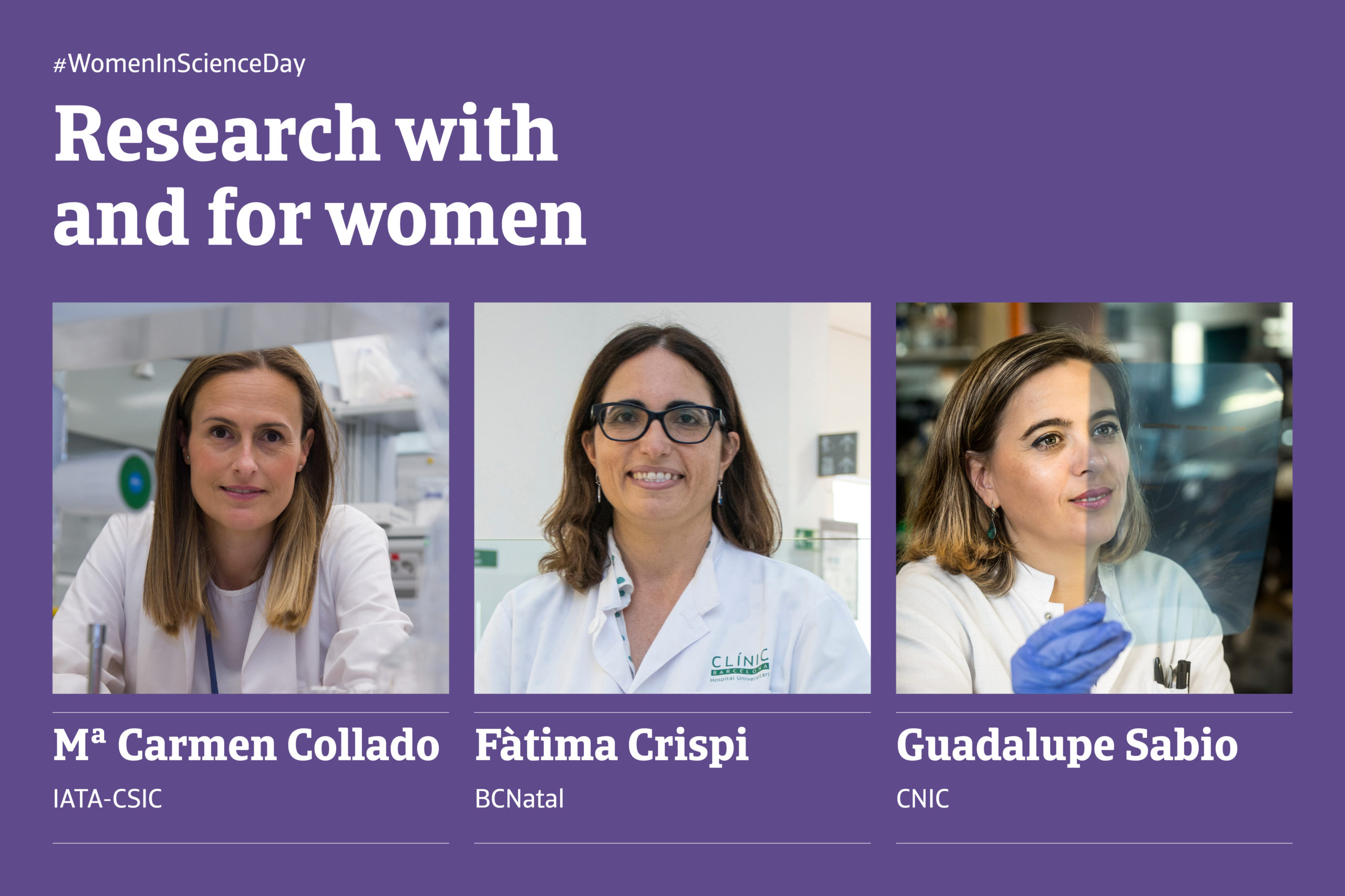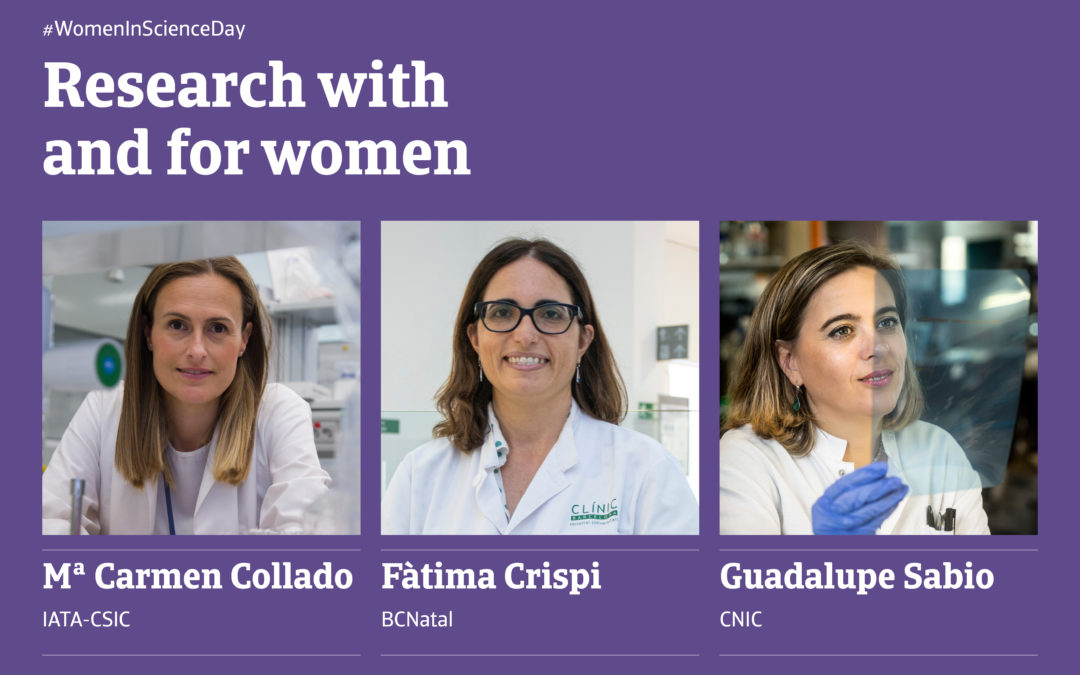
Today is International Day of Women and Girls in Science, and we are bringing you the stories of three women scientists who are researching the effects of food and nutrition on health. Their results show that a healthy diet is not limited to a single type of diet, and also that a balanced diet has a positive effect on our own health and that of our children.
M.ª Carmen Collado, from the Institute of Agrochemistry and Food Technology (IATA-CSIC), Fàtima Crispi , from the Maternal-Fetal Medicine Centre (BCNATAL) of the Hospital Clínic de Barcelona and Hospital Sant Joan de Déu, and Guadalupe Sabio, from the National Centre for Cardiovascular Research (CNIC), not only share a passion for research, but they are also the three winners of the Fundación Occident Research Awards, a prize awarded to scientists conducting research into the role of food and nutrition in a longer and healthier life.
Guadalupe Sabio
“A diet rich in fat during pregnancy and breastfeeding may prevent some cardiovascular diseases.“
In autumn 2021, Sabio’s team at the CNIC discovered the role played by two proteins -called p38γ and p38d – in the metabolism of the heart of newborns. Any alteration in this metabolism causes irreversible heart damage. However, this announcement comes with good news: it may be treatable with a change in diet.
What is the role of these proteins in a baby’s heart?
They are responsible for regulating the metabolic change that the heart undergoes at birth. During the fetal stage, the heart is fed mostly with glucose, but after leaving the mother’s womb, it feeds mainly on fatty acids. This change allows the baby’s heart to develop rapidly at birth. The heart grows faster and becomes much more efficient in obtaining energy.
What happens to the baby when this change does not work properly?
We have seen that this leads to irreversible changes to the heart, but also, the inability to provide sufficient energy to the body also causes other metabolic diseases, such as diabetes.
Is there a cure?
We believe so, although we have only conducted research on mice. Here, we have seen that if the mothers have a fat-rich diet during pregnancy and breastfeeding, we can produce the excess energy that the baby needs. By adapting the diet, the babies did not experience any heart damage or symptoms of diabetes.
In fact, research into these proteins has led Sabio and her team to new discoveries. Now we know that they also play a role in hypertrophic cardiomyopathy. “Furthermore, the importance of metabolism in the heart to regulate and improve its function would indicate that the regulation of this cardiac metabolism in adults could be used as a therapeutic target after a heart attack or to reduce cardiovascular risks in adults.”
Fàtima Crispi
“A significant percentage of pregnant women do not follow a balanced diet to ensure their baby’s present and future health.”
Fàtima Crispi shares this interest in the cardiovascular health of infants. In fact, her research starts at the fetal stage because fetal development conditions neonatal health, and also up to 30% of health risks in adults. At BCNatal, Crispi and her team also determined that the mother’s diet can be key to preventing cardiovascular problems in neonates and in the long term.
Why are you so interested in conducting research into newborns with low birth weight?
Because this condition affects 10% of births. In extreme cases, infants are born with serious cardiovascular problems. And we have also seen that these babies have a greater risk of cardiovascular disease than adults.
And do you know why this happens?
In these cases, the placenta does not work as well as it should, and the baby receives less oxygen and nutrients. Given the scarcity of nutrients, the heart compensates for this deficit: it grows larger and works harder. Hypertrophic cardiomyopathy occurs and persists over time, and is the likely cause of cardiovascular problems throughout life.
And what is the impact of the mother’s diet?
First, we try to treat it with medication, but we aren’t able to make changes in the placenta. We already know, thanks to studies carried out in populations exposed to malnutrition, that poor nutrition during pregnancy can lead to increased disease risk for children later in life. So, we decided to study the situation of women in Spain. And we never imagined that ensuring a balanced diet could be so important. In a study with more than one thousand women, we found that if mothers followed a strict Mediterranean diet throughout pregnancy, the number of children born with low birth weight dropped by one third, and cardiovascular problems also seemed to disappear.
And what can we learn from this?
There are two answers. Firstly, we have to continue research into what happens to the fetus during its development. Our health can benefit so much from what we learn.
And secondly, although we think we know a lot about a healthy diet, in reality we know very little. If pregnant women do not follow a balanced diet, which is probably the time in their life when they most take care of themselves, imagine what happens when we are not pregnant, or what happens in men.
Crispi continues to study the cohort of children that began with the study of their pregnant mothers. Her aim is now to monitor their heart development and also their general state of health.
M.ª Carmen Collado
“Diet during pregnancy and breastfeeding plays an important role in maternal and child health. Breastfeeding is the most important postnatal factor in mother-infant bonding.”
After becoming a mother herself, M.ª Carmen Collado was interested in understanding the role of maternal nutrition during pregnancy and breastfeeding. She especially focuses on how it affects the properties of breast milk, not only in its nutritional composition, but also in functional components including bacteria, metabolites, as well as other key components in the child’s and future adult’s health.
Does this confirm that correct nutrition is extremely important for health?
Yes, I think that few people doubt this nowadays. What we have seen is that nutrition plays a key role in the early moments of life. In fact, we study how foods influence the microbiota of the newborn during its early years and their relationship to the risk of noncommunicable diseases, such as obesity and allergies, among others, in childhood and adulthood.
And is diet an important factor in your research?
Yes, but not only diet per se, but also how it modulates the microbiota. The mother’s diet during pregnancy and breastfeeding conditions neonatal microbiota. And, as we know, exposure to bacteria and other organisms plays a key role in the development of our immune system and metabolism, and also influences brain development. Therefore, it is important to learn how to take care of the microbiota of pregnant woman and the infant through diet. This knowledge will allow us to develop dietary recommendations to improve maternal microbiota and understand its impact on the development of the infant’s bacterial colonization of the intestine, the maturity of the immune system and the programming of the child’s and future adult’s health.
And now that you know these effects, what research are you conducting at the IATA?
How to intervene at this key stage to modulate the microbiota and improve health. The idea is to do this through diet, as well as through the use of dietary supplements and the use of probiotics and prebiotics aimed at modulating microbiota during these crucial stages in human life. I’m not exaggerating when I say that doing this, and doing so at such an early stage, could be one of the best strategies for public health and prevention.
Now, Collado and her team continue to study the MAMI birth cohort, doing a follow-up check at six years old. They will study the nutritional and microbiota relationship in the health of the child and adolescent and identify noncommunicable disease risk biomarkers. In parallel, they are studying the relationship between diet and microbiota during pregnancy and how it affects the health of pregnant woman.

